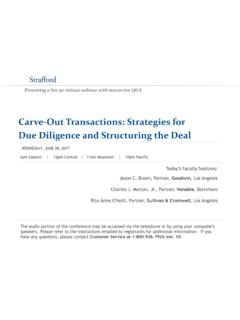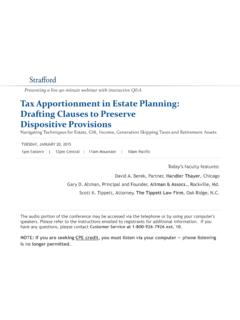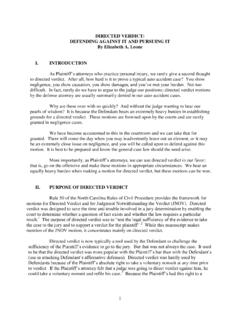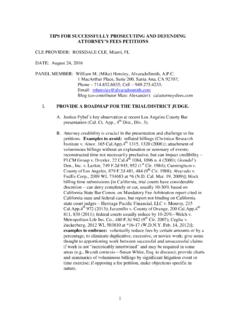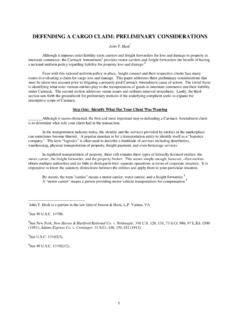Transcription of Mental Illness Under the ADA and FMLA: Avoiding and ...
1 Presenting a live 90-minute webinar with interactive Q&A. Mental Illness Under the ADA and fmla : Avoiding and defending Claims Determining Reasonable Accommodation and fmla Leave;. Leveraging Expert Witnesses, Motion and Trial Strategies WEDNESDAY, JULY 9, 2014. 1pm Eastern | 12pm Central | 11am Mountain | 10am Pacific Today's faculty features: Susan K. Fitzke, Shareholder, Littler Mendelson, Minneapolis Jonathan R. Mook, DiMuroGinsberg, Alexandria, Va. Frank C. Morris, Jr., Member, Epstein Becker & Green, Washington, The audio portion of the conference may be accessed via the telephone or by using your computer's speakers.
2 Please refer to the instructions emailed to registrants for additional information. If you have any questions, please contact Customer Service at 1-800-926-7926 ext. 10. FOR LIVE EVENT ONLY. Sound Quality If you are listening via your computer speakers, please note that the quality of your sound will vary depending on the speed and quality of your internet connection. If the sound quality is not satisfactory, you may listen via the phone: dial 1-866-258-2056 and enter your PIN when prompted. Otherwise, please send us a chat or e-mail immediately so we can address the problem.
3 If you dialed in and have any difficulties during the call, press *0 for assistance. Viewing Quality To maximize your screen, press the F11 key on your keyboard. To exit full screen, press the F11 key again. FOR LIVE EVENT ONLY. For CLE purposes, please let us know how many people are listening at your location by completing each of the following steps: In the chat box, type (1) your company name and (2) the number of attendees at your location Click the SEND button beside the box If you have purchased Strafford CLE processing services, you must confirm your participation by completing and submitting an Official Record of Attendance (CLE.)
4 Form). You may obtain your CLE form by going to the program page and selecting the appropriate form in the PROGRAM MATERIALS box at the top right corner. If you'd like to purchase CLE credit processing, it is available for a fee. For additional information about CLE credit processing, go to our website or call us at 1-800-926-7926 ext. 35. FOR LIVE EVENT ONLY. If you have not printed the conference materials for this program, please complete the following steps: Click on the ^ symbol next to Conference Materials in the middle of the left- hand column on your screen.
5 Click on the tab labeled Handouts that appears, and there you will see a PDF of the slides for today's program. Double click on the PDF and a separate page will open. Print the slides by clicking on the printer icon. Mental Illness Under THE ADA AND fmla : Avoiding AND defending CLAIMS. July 9, 2014. 1:00 2:30 EDT. Presented by Strafford Publications, Inc. Frank C. Morris, Jr. Epstein Becker & Green, PC. 1227 25th Street, NW. Washington, DC 20037. (202) 861 1880; 2014 EPSTEIN BECKER GREEN, ALL RIGHTS RESERVED. ATTORNEY ADVERTISING.
6 The Expanded Coverage of the ADAAA and EEOC. Regulations Background A disability Under the Americans with Disabilities Act is: 1. A physical or Mental impairment that substantially limits one or more major life activities;. 2. A record (or previous history) of such an impairment; or 3. Being regarded as having a disability 2014 Epstein Becker & Green, | All Rights Reserved. | 6. Changes to the ADA. Under the ADAAA, the three-pronged definition of a disability remains the same, BUT: - the ADAAA changes how the first and third prongs are evaluated Mandates liberal interpretation of substantially limits.
7 - To maximum extent permitted by ADA. - Need not limit more than one major life activity Expanded prior definition of major life activities ( MLAs ) to include a range of activities such as: Eating, sleeping, standing, lifting or bending, learning, reading, thinking, concentrating, and communicating 2014 Epstein Becker & Green, | All Rights Reserved. | 7. EEOC's Rules of Construction: Impairments that Are Episodic or in Remission An impairment that is episodic or in remission meets the definition of disability if it would substantially limit a major life activity when active.
8 Episodic or in remission: , Bipolar disorder Major depressive disorder Schizophrenia PTSD. 2014 Epstein Becker & Green, | All Rights Reserved. | 8. Defining Intellectual Disabilities Under the ADA. EEOC Regulations 29 (h) Physical or Mental impairment means (1) Any physiological disorder or condition, cosmetic disfigurement, or anatomical loss affecting one or more body systems ; or (2) Any Mental or psychological disorder, such as an intellectual disability (formerly termed Mental retardation'), organic brain syndrome, emotional or Mental Illness , and specific learning disabilities.
9 Full text of regulations available at 2014 Epstein Becker & Green, | All Rights Reserved. | 9. Categories of Mental Impairments Mood Disorders Depression, Bipolar, Seasonal Affective Disorder, Dysthymia Anxiety Disorders Phobias, Panic disorder, Generalized anxiety disorder, OCD, PTSD. ADHD. Schizophrenia Spectrum Disorders Physicians' source for classifying Mental illnesses: Diagnostic and Statistical Manual of Mental Disorders (5th Ed. 2013). 2014 Epstein Becker & Green, | All Rights Reserved. | 10. What Intellectual Disabilities are Substantially Limiting?
10 According to the EEOC, the following impairments, given their inherent nature, will virtually always be found to impose a substantial limitation on brain function, a major life activity: Intellectual disability Schizophrenia Bipolar disorder Autism Major depressive disorder Post-traumatic stress disorder (PTSD). Obsessive-compulsive disorder (OCD). 29 (j) (3) (ii)-(iii). 2014 Epstein Becker & Green, | All Rights Reserved. | 11. What is not Considered an Intellectual Disability? Normal sadness or grief that is brought on by a traumatic event but that is expected to pass with time ( death, divorce).
